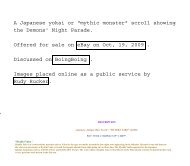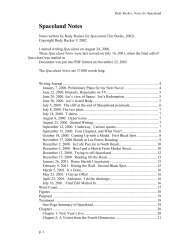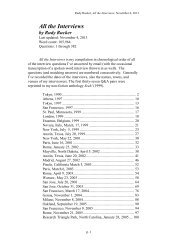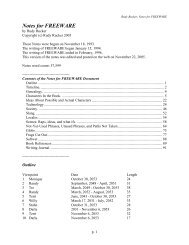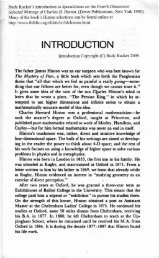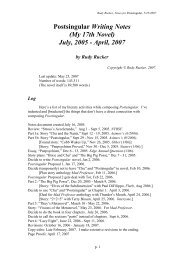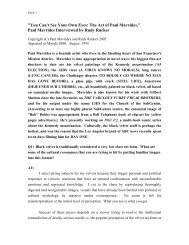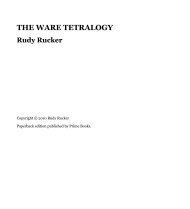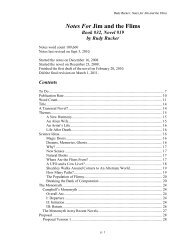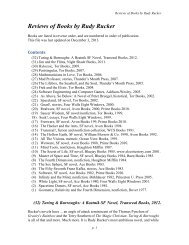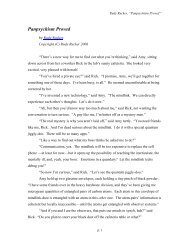Notes for the Lifebox, the Seashell, and the Soul - Rudy Rucker
Notes for the Lifebox, the Seashell, and the Soul - Rudy Rucker
Notes for the Lifebox, the Seashell, and the Soul - Rudy Rucker
Create successful ePaper yourself
Turn your PDF publications into a flip-book with our unique Google optimized e-Paper software.
<strong>Notes</strong> <strong>for</strong> The <strong>Lifebox</strong>, <strong>the</strong> <strong>Seashell</strong>, <strong>and</strong> <strong>the</strong> <strong>Soul</strong>, by <strong>Rudy</strong> <strong>Rucker</strong><br />
particular could I drop VR <strong>and</strong> computer games?<br />
I’m planning such a radical revision of <strong>the</strong> notes that I think I’ll save off my current<br />
outline as “Computers <strong>and</strong> Reality <strong>Notes</strong>, July 2, 2003.doc”.<br />
July 4, 2003. <strong>Lifebox</strong>, Quantum Mind, NKS Triad.<br />
Thesis: <strong>the</strong> lifebox.<br />
Anti<strong>the</strong>sis: <strong>the</strong> quantum mind.<br />
Syn<strong>the</strong>sis: NKS-style automata, which possibly are quantum computers.<br />
Maybe just call it The <strong>Lifebox</strong>.<br />
I see <strong>the</strong> mind’s churning as being like <strong>the</strong> eddies in a von Karman vortex street<br />
bouncing off each o<strong>the</strong>r. I love Wolfram’s notion of coming up with a higher-order<br />
automaton procedure involving <strong>the</strong> eddies. In this way we are free to ignore sensitive<br />
dependence, that is, we can ignore (a) <strong>the</strong> <strong>the</strong>rmal bath r<strong>and</strong>omization <strong>and</strong> decoherence, <strong>and</strong><br />
(b) we don’t have to pay so much attention to <strong>the</strong> excavation of digits.<br />
July 14, 2003. Popular Interest in AI.<br />
Yesterday I was on a panel about “The Singularity” at <strong>the</strong> science-fiction Readercon<br />
15 in Burlington, Mass.<br />
I was surprised, again, how really naive most people are about AI. Always you hear<br />
<strong>the</strong> same arguments why a machine can’t be like a person. That a machine “doesn’t care” if<br />
it wins (but it does “care” if we give it a utility function), that a machine “doesn’t make<br />
mistakes” (not only can r<strong>and</strong>om errors easily be produced but, in use, machines tend to<br />
accumulate dead storage areas that make <strong>the</strong>m run less well), etc.<br />
As always, <strong>the</strong> faces light up when I talk about <strong>the</strong> merged higher consciousness that<br />
we know, from <strong>the</strong> inside, that we have.<br />
My fellow SF writers seemed wholly unable or unwilling to discuss <strong>the</strong> Singularity<br />
argument’s three moves as <strong>for</strong>mulated by me: (a) strong AI will occur, that is, machines<br />
equivalent to humans in mental power will be evolved, (b) once we have strong AI, we can<br />
easily get superhuman intelligence by running <strong>the</strong> machines faster <strong>and</strong> giving <strong>the</strong>m more<br />
memory, <strong>and</strong> (c) each generation of superhuman machines can design a still smarter next<br />
generation, setting off a cascade of more <strong>and</strong> more powerful artificial minds.<br />
Of <strong>the</strong>se three steps, only (b) is unexceptionable.<br />
(a) may in fact never come true; strong AI may <strong>for</strong>ever remain a will ’o’ <strong>the</strong> wisp. At<br />
this point really <strong>the</strong> only strong general purpose method <strong>for</strong> AI we have is neural nets.<br />
Training a given net isn’t terribly slow, but trying to evolve towards <strong>the</strong> correct net<br />
architecture is an exponential search problem.<br />
(c) is by no means a given. For if we look at <strong>the</strong> first step of <strong>the</strong> cascade, in which we<br />
humans design machines able to work as well as (let alone better than) ourselves, we find<br />
that this step is an exponential search problem. So why should it necessarily be <strong>the</strong> case that<br />
machine generation n can very easily design generation n+1?<br />
July 23, 2003. Brockman Enters <strong>the</strong> Fray.<br />
So I’m signed on with John Brockman; he only wants to represent this one book,<br />
doesn’t want to touch an SF novel, we have a single-book agency agreement. Though he<br />
p. 117




